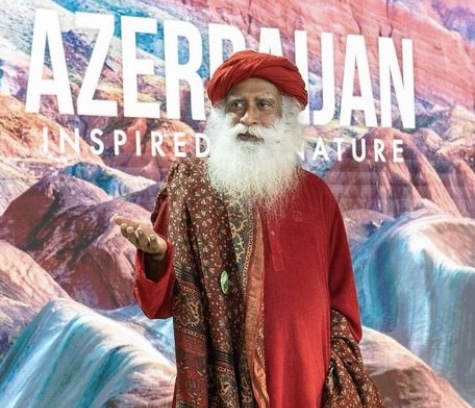This website uses cookies so that we can provide you with the best user experience possible. Cookie information is stored in your browser and performs functions such as recognising you when you return to our website and helping our team to understand which sections of the website you find most interesting and useful.
Leading guru calls for greater organic soil health
Speaking at COP29 one of the most famous gurus in the world issued an impassioned cry for governments to commit to converting 3% of their soils to organic.

Jagadish Vasudev, better known as Sadhguru, has more than 12 million Instagram followers and regularly posts about how to cleanse negative emotions and take care of your mind and body through practices such as hatha yoga, meditation and dietary choices.
Now, the world-famous guru has called for nations around the world to push soil health to the fore of their dialogues about climate change.
Sadhguru, who founded the Save Soil movement, is currently attending the COP29 event, being held in Azerbaijan between 11-22 November. In his presentation on the third day of the event he spoke about the “alarming decline” of soil health, and the nutritional value of the resulting food and drinks made from products grown in the soil, before warning that urgent steps need to be taken within the next 10-15 years in order to revitalise the Earth’s soils.
Government policies
He also stressed the importance of turning agriculture into a profitable venture and empowering farmers. As part of this, he urged individual governments to commit to 3% of their soil becoming organic.
“Human physical and mental wellbeing is being directly impacted by the soil,” Sadhguru told i. However, “at COP26 in Glasgow, soil was not mentioned once. People seemed surprised when we wanted to talk about it….it’s a movement now, but we need to see government policies.”
He also revealed a new body of research compiled by Save Soil that shows that just 1% of carbon released from Europe’s soils would be the equivalent of the annual carbon emissions from 1 billion cars.
According to a separate European Commission report compiled by DG Environment, many soils in Europe – largely those under grassland, forests and natural vegetation – are accumulating carbon and thus act as carbon stores or ‘sinks’. Consequently, European soils are a huge store of carbon.
Given that the EU’s annual emissions of CO2 are just over 4 billion tonnes, releasing even a fraction of the carbon held in soil into the atmosphere would have a significant effect on efforts to fight climate change.
The soils with the highest emission potential are those with the highest organic matter content.
Organic wine
Organic viticulture is on the rise, with consumers increasingly seeking out organic bottles for health and sustainability reasons.
As db has reported, the global organic wine market was worth US$10.8 billion in 2023, and is expected to expand at a CAGR rate of +10.4% by 2030, with 60% of total organic wine volumes currently concentrated in France, Germany and the UK.
Many more producers take an organic approach to viticulture but choose not to pursue official certification due to the often heavy administrative requirements. Find out more by reading our investigation: Is organic certification worth the hassle?
Firmly in the pro-certification camp is Argentine producer Domaine Bousquet. Co-owner Anne Bousquet told the drinks business earlier this year: “It’s not enough for a winery to talk of adopting organic practices, while not obtaining certification. I like to say that it is like dating someone but not committing to marriage…”
“Effectively, this gives wineries a loophole so they can pick and choose when to be organic. It doesn’t work like that. Working organically is a commitment; it can mean making tough decisions, but the outcome is absolutely worth the investment. Better soil health equals better grapes, equals better wines.”
Moreover, a global survey of almost 20,000 wine drinkers, carried out by IWSR in October 2022, found that 22% of respondents agreed that organic wine was of “higher quality” than conventionally-made wine.
Working together
Following last year’s COP28 in Dubai, a five-page declaration was released highlighting key areas of concern for land use and global agriculture, which together account for around 30% of the world’s emissions. Last year, 152 countries had signed up to the declaration.
But many felt it didn’t go far enough.
Last year, The International Wineries for Climate Action (IWCA) told db that the COP28 draft agreement was ‘far from enough’ and that it would keep advocating for a rapid phase out of fossil fuels.
Related news
Evelyne de Pontbriand dies, aged 74
Watermill Wines goes for organic Grillo
164th Hospices de Beaune charity auction to mark the domaine’s organic certification

